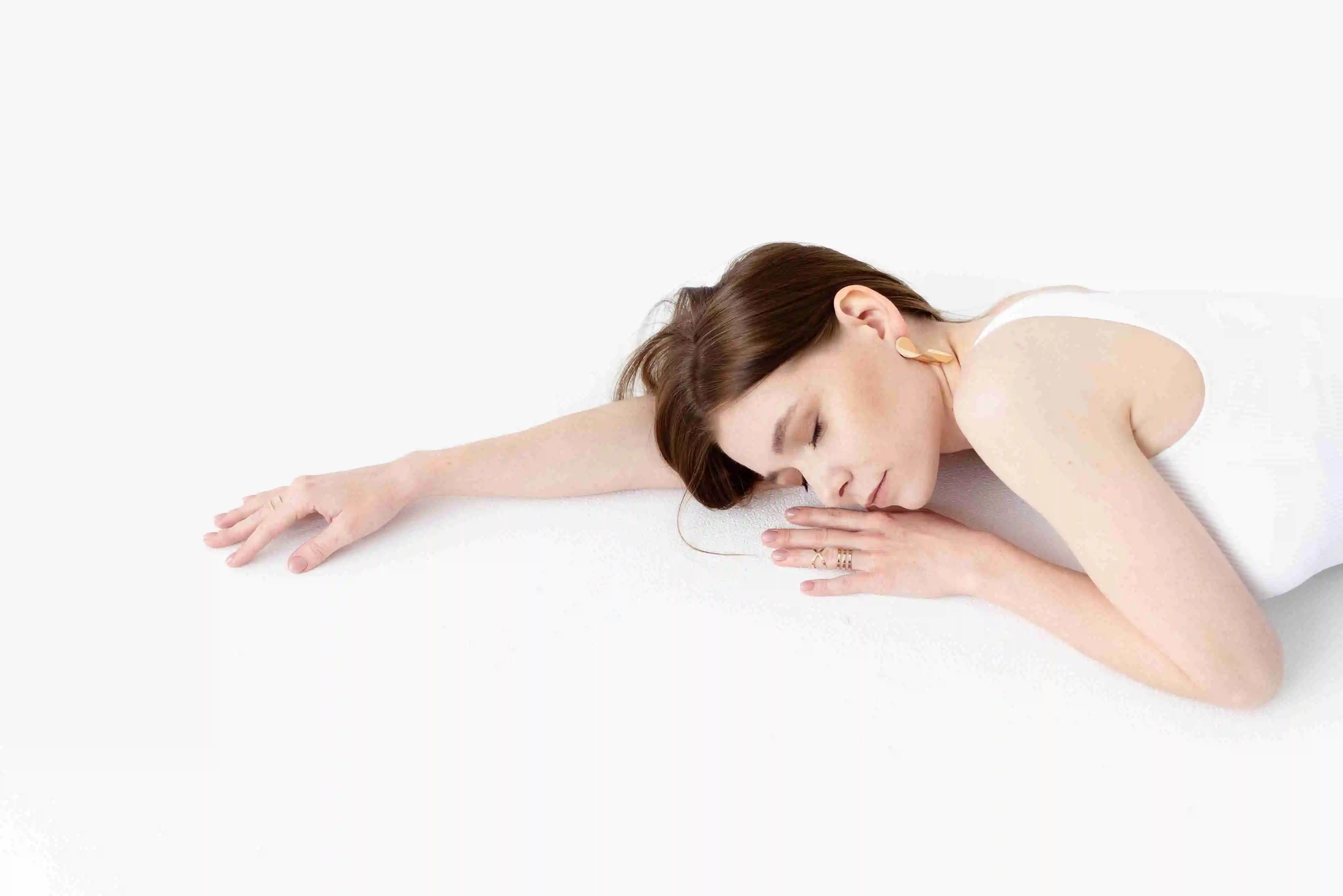
Stomach sleeping isn’t the most common sleeping position; however, a good portion of sleepers prefer that sleeping position over back or side sleeping positions, and it does have some benefits, such as a significant decrease in snoring and acid reflux.
However, there are also some serious drawbacks associated with stomach sleeping that people who prefer this sleeping position need to be aware of.
What is stomach sleeping?
Stomach sleeping, also known as prone sleeping, is a sleeping position where an individual lies on their stomach with their face turned to one side. It is one of the most common sleeping positions, with approximately 7% of adults preferring this position.
Benefits of Stomach Sleeping
Reduced Snoring
One of the main advantages of stomach sleeping is its potential to reduce snoring. Snoring occurs when the airway becomes partially blocked during sleep, leading to the vibration of tissues in the throat. By lying on the stomach, gravity helps to keep the airway open, reducing the likelihood of snoring.
Reduced Acid Reflux
Acid reflux occurs when stomach acid flows back into the esophagus, causing a burning sensation and discomfort. Sleeping on the stomach can help prevent the backflow of acid by keeping the head elevated and reducing the likelihood of acid reaching the esophagus.
Alleviates Sleep Apnea
Stomach sleeping proved to be beneficial for individuals with sleep apnea, which is a condition characterized by interruptions in breathing during sleep. Stomach sleeping can help keep the airway open and reduce the frequency and severity of apnea episodes.
Cons of Stomach Sleeping
Spine Misalignment
When lying on the stomach, the natural alignment of the spine is compromised, leading to strain on the back muscles and a potential long-term issue.
In some cases, this misalignment could result in chronic pain and discomfort, affecting daily activities and overall quality of life.
Neck Pain
Stomach sleepers often suffer from soreness and stiffness in their necks, and that’s because when sleeping on the stomach, the neck is forced to remain in an unnatural position for an extended period.
A temporary solution for this is to use a soft pillow, which will allow your neck to sink into the pillow and maintain a neutral alignment with the spine.
Facial Wrinkles
The repeated pressure exerted on the face when sleeping face-down on your stomach can contribute to the formation of fine lines and wrinkles. This can be particularly concerning for individuals who prioritize maintaining a youthful appearance.
Poor Sleeping Quality
When you sleep on your stomach, your spine tends to be in an unnatural position, which can lead to discomfort and disrupted sleep. This can result in frequent tossing and turning throughout the night, making it difficult to achieve a deep and restful sleep.
Poor sleeping quality can have negative effects on your overall well-being, leading to daytime fatigue, decreased concentration, and mood disturbances.
Restricted Breathing
Stomach sleeping can put pressure on your chest and diaphragm, making it harder to breathe, which can lead to shallow breathing or even temporary interruptions in breathing.
Restricted breathing during sleep can have detrimental effects on your health, as it can lower oxygen levels in the body and increase the risk of developing respiratory issues over time.
Who should sleep on their stomachs?

Those With Snoring Problems
Many people with snoring problems found that sleeping on their stomach helps with that issue, as snoring occurs when the airway becomes partially blocked during sleep, and by sleeping on the stomach, gravity helps keep the airway open and reduces the likelihood of snoring. This can lead to more restful sleep for both the individual and their partner.
Those With Certain Types of Back Pain
In some cases, sleeping on the stomach can help align the spine in a more neutral position; however, it is important to note that this position may not be suitable for everyone with back pain, as it can also place stress on the neck and shoulders.
It is always recommended to consult with a healthcare professional before making any changes to your sleep position if you have pre-existing back issues.
Those With Digestive Issues
For individuals who experience digestive issues such as acid reflux or heartburn, sleeping on the stomach may help alleviate symptoms; nevertheless, it is important to note that this position may not be suitable for everyone with digestive issues, as it can also put pressure on the organs and exacerbate certain conditions.
People With a Preference for this Position
Some people prefer the stomach sleeping position more than any other sleeping position, as it offers them the comfort and support they need to get a good night’s sleep and wake up the next morning feeling well-rested.
People With Sleep Apnea
Sleep apnea is a condition characterized by pauses in breathing during sleep, which can lead to poor sleep quality and increased risk of other health issues. For some individuals with mild sleep apnea, sleeping on the stomach can help keep the airway open and reduce the occurrence of breathing pauses.
Tips for Optimal Stomach Sleeping
Use a Thin Pillow or No Pillow at All
Since sleeping on your stomach can strain your neck and back, using a thin pillow helps to keep your spine aligned and reduces the risk of discomfort or pain.
A thin pillow allows your head to rest in a more neutral position, preventing excessive pressure on your neck and shoulders. By choosing a thin pillow, you can ensure that your body is properly supported while sleeping in this position.
Choose a Firm Mattress
A firm mattress provides the necessary support for your body, especially for your spine and back. When you sleep on your stomach, there is a risk of sinking too deeply into a soft mattress, which can lead to misalignment of your spine and cause discomfort or pain.
A firm mattress helps to keep your body in a more neutral position, preventing any unnecessary strain on your muscles and joints. Knowing which mattress to buy is very important, so make sure to choose wisely what works for your body.
Focus on Spinal Alignment
If stomach sleeping is causing irritation on your back and allowing for spinal misalignment, it’s important to have a level of awareness of that issue while you’re asleep, so you need to focus on your spinal alignment and become more sensitive to a spinal misalignment so you can be able to resolve the issue once you start feeling like the neutral spinal alignment is compromised.
Finding the Right Sleep Position

Consider Your Needs
To find the best sleeping position for you, you need to know what your sleeping preferences and habits are, and according to that, you need to choose the best sleeping position that aligns with these preferences and provides the most comfort while eliminating any sort of pain or stiffness.
Evaluate Your Body Type
It’s a known fact that each body type prefers different sleeping positions, For example, heavier individuals might like sleeping on their stomach, as it alleviates the pressure from their shoulders, hips, and lower back; meanwhile, light sleepers might enjoy back sleeping, as it maintains their neutral spinal alignment and their weight doesn’t add any excessive pressure on their spine or lumbar.
Experiment with Different Positions
Try out different sleeping positions before deciding which one you like the most. Even if you think that you know your favourite sleeping positions, trying different sleeping positions might prove to you that other sleeping positions offer a higher level of comfort and support.
Listen to Your Body
If you wake up every morning with joint or muscle pain, then you need to understand that this is your body giving you a signal to change your sleeping position before the occurrence of any long-term issue, so make sure that you’re listening to your body when it gives you discomforting signals.
Invest in a Supportive Mattress
The reason behind waking up unrested and feeling joint pain might have nothing to do with the sleeping position; it could be because your mattress doesn’t provide a sufficient level of support for your body or your weight, so make sure to invest in a supportive and comfortable mattress. For more information about the best mattresses, click here.
Consult a Healthcare Professional
It’s crucial to consult a healthcare professional if you wake up every day feeling tired, unrested, or feeling joint pain, as a professional can help you discover what is the specific issue that is preventing you from getting a good night’s sleep and how to mitigate against it.
FAQs
Is sleeping on your stomach bad for you?
Sleeping on the stomach is not generally recommended, as this position can put a strain on your neck and spine, leading to discomfort and potential long-term issues. Additionally, sleeping in this position can put pressure on your internal organs and affect their proper functioning. It can also lead to breathing difficulties and disrupt your sleep quality. Therefore, it is recommended to try alternative sleeping positions, such as sleeping on your back or side, to promote better sleep and overall health.
Is it okay to sleep on your stomach if you're pregnant?
Stomach sleeping positions during pregnancy can pose certain risks and discomfort for pregnant women, as they could potentially lead to decreased blood flow; furthermore, lying on your stomach may cause back and neck pain, as well as contribute to heartburn and indigestion. Side sleeping is generally recommended for pregnant women, particularly on the left side, as it improves circulation and minimizes the risk of complications.
What is the best sleeping position?
One of the most recommended sleeping positions is back sleeping. Sleeping on your back allows the head, neck, and spine to align properly, reducing the risk of developing muscle and joint pain. It also helps to minimize the occurrence of acid reflux and wrinkles on the face.
What is the best mattress type for stomach sleeping?
The best mattress firmness for stomach sleepers is a medium-firm or firm mattress. As these firmness options help to maintain proper spinal alignment and alleviate strains from pressure points, mattresses with a combination of memory foam and innerspring coils can be beneficial for stomach sleepers as they offer both support and contouring comfort.
How do I stop sleeping on my stomach?
If you tend to sleep on your stomach, you should consider switching to a different sleeping posture. You should try to gradually transition into side sleeping, as it's better for body alignment and will provide more sleep comfort; however, for some people, it might cause muscle strain or shoulder pain, so you need to try it for a bit before adopting side sleeping as your go-to sleeping position.
Conclusion
While stomach sleeping may be comfortable for some, it is not recommended, and it's not one of the best sleep habits due to its potential negative effects on sleep health.
This sleeping position can lead to strain on the neck and spine, resulting in joint pressure and discomfort. It is advisable to try alternative sleeping positions, such as sleeping on the back or side, as these positions are much safer in the long term and provide better support, which contributes to an overall enhanced sleeping experience.
Karen Barnard
Karen is a Human Movement Science expert and a certified sports nutrition and massage therapist. At Sleepiverse, she combines her passion for human movement science and sleep health to educate herself and her readers about healthier sleep. In addition to writing articles, Karen manages a fitness studio offering private training, athletic conditioning, and sports massage therapy. She focuses on providing people with a holistic environment for people to reach their health goals, often incorporating stretch therapy to promote mental tranquillity and help people improve their sleep.


